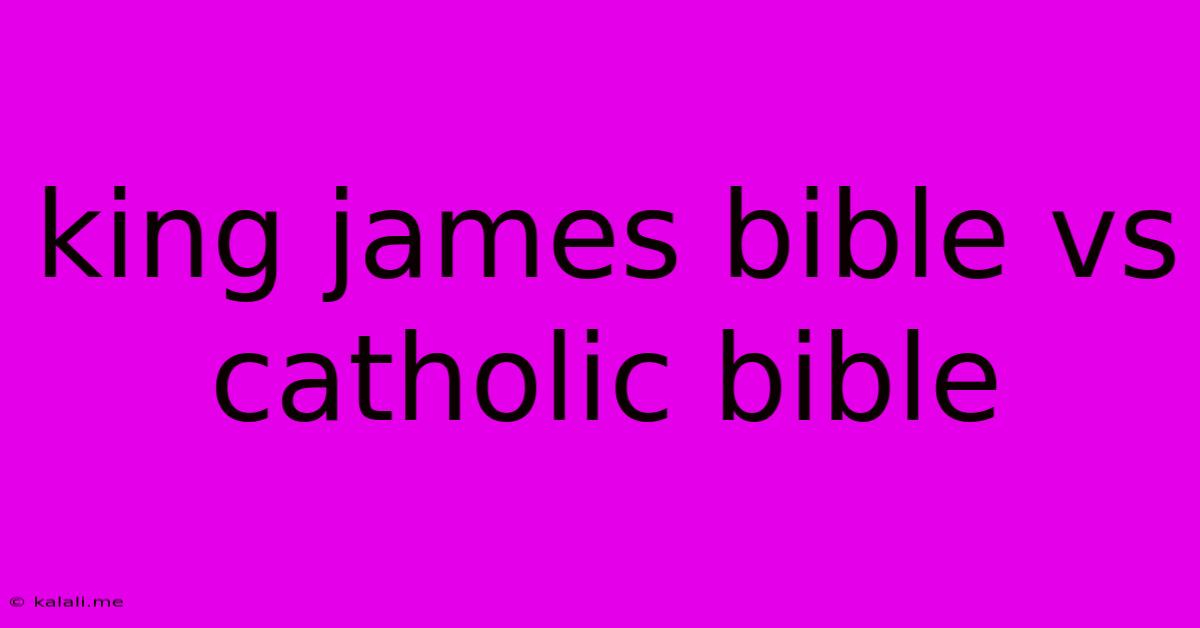King James Bible Vs Catholic Bible
Kalali
Jun 07, 2025 · 3 min read

Table of Contents
King James Bible vs. Catholic Bible: A Detailed Comparison
The Bible, a cornerstone of Christianity, exists in numerous versions, each with its own history, translation choices, and theological nuances. Two prominent versions frequently compared are the King James Version (KJV) and the Catholic Bible. While both contain the same core texts, significant differences exist, primarily in their book selections and translation philosophies. This article delves into these key distinctions, helping you understand the nuances of each version and its relevance to different Christian denominations.
What's Included: A Tale of Two Canons
The most significant difference lies in the canon, or the collection of books considered divinely inspired and thus included in the Bible. The Catholic Bible features 73 books, encompassing the Old Testament, the New Testament, and deuterocanonical books (also known as apocryphal books). These additional books, including Tobit, Judith, Wisdom, Sirach (Ecclesiasticus), Baruch, 1 and 2 Maccabees, and additions to Esther and Daniel, are considered canonical by the Catholic Church, but not by most Protestant denominations, including those that use the KJV.
The King James Bible, a Protestant Bible, contains 66 books, comprising only the Old and New Testaments as recognized by Protestant churches. The exclusion of the deuterocanonical books is a key historical distinction stemming from the Protestant Reformation. Martin Luther, a pivotal figure in the Reformation, questioned the canonical status of these books, a sentiment later reflected in the KJV.
Translation and Language: Style and Interpretation
Beyond the inclusion or exclusion of books, the KJV and Catholic Bibles differ in their translation approaches and resulting literary styles.
-
King James Version (KJV): Known for its majestic, archaic language, the KJV is celebrated for its poetic beauty and enduring impact on English literature. However, its archaic language can pose challenges for modern readers, requiring a degree of familiarity with older English vocabulary and sentence structures. The KJV's translators aimed for a literal translation, prioritizing word-for-word accuracy over conveying the intended meaning in modern English.
-
Catholic Bibles: Catholic Bibles exist in numerous translations, each with its own unique characteristics. While some aim for literal accuracy like the KJV, others prioritize conveying the meaning clearly to a contemporary audience, employing more modern language. This results in a range of readability levels among Catholic Bibles. The focus tends to be on conveying the message clearly while remaining faithful to the original texts.
Theological Implications: Different Perspectives
The differing canons and translation styles inherently lead to subtle, and sometimes significant, theological implications. The inclusion of deuterocanonical books in the Catholic Bible provides a richer context for understanding certain biblical themes and concepts, particularly regarding the history of the Jewish people and their relationship with God. The exclusion of these books in the KJV may affect the interpretation of certain passages in the Old Testament. For instance, the Book of Wisdom offers perspectives on wisdom and divine judgment which aren't available in the KJV.
Which Bible is Right for You?
The choice between the KJV and a Catholic Bible ultimately depends on individual needs and preferences.
-
For those seeking a historically significant and aesthetically pleasing translation: the KJV offers a unique literary experience. However, its archaic language might present challenges.
-
For those prioritizing modern readability and access to the full Catholic canon: a modern Catholic Bible translation offers a clearer understanding of the text and includes books absent from the KJV.
-
For scholarly study: comparing both versions is essential for a complete understanding of biblical texts and their interpretations across different traditions.
Ultimately, both the KJV and Catholic Bibles hold significant places within the history and practice of Christianity. Understanding their differences allows for a more nuanced appreciation of the rich tapestry of biblical interpretation and the ongoing dialogue within Christian faith.
Latest Posts
Latest Posts
-
Sounds That Dont Exist In Russian
Jun 07, 2025
-
Espresso Coffee In A French Press
Jun 07, 2025
-
When Theres A Comma Theres A Pause For A Beat
Jun 07, 2025
-
Temperature Gradient From Internal Fluid To Internal Pipe Wall
Jun 07, 2025
-
2 Cups Instant Rice Equals How Much Regular Rice
Jun 07, 2025
Related Post
Thank you for visiting our website which covers about King James Bible Vs Catholic Bible . We hope the information provided has been useful to you. Feel free to contact us if you have any questions or need further assistance. See you next time and don't miss to bookmark.